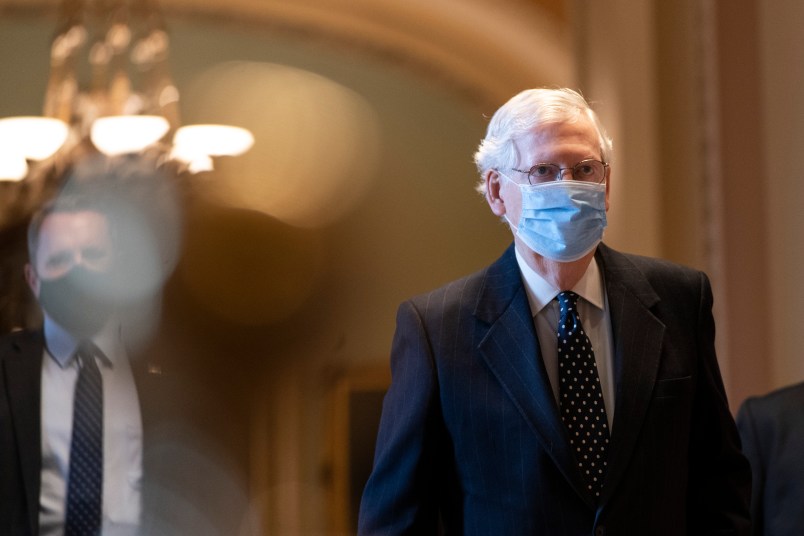After handily steering a majority of his party away from convicting former President Donald Trump for inciting an insurrection on the U.S. Capitol last month, Senate Minority Leader Mitch McConnell (R-KY) penned an op-ed in the Wall Street Journal on Monday to clean up lingering questions about the GOP’s morally dubious decision to effectively let Trump off the hook.
The top Senate Republican delivered a lengthy procedural argument against the constitutionality of impeaching a former president — using the very circumstances of a delayed impeachment that he had crafted to justify a decision to acquit the president.
In spite of signaling early on Saturday that he would vote against conviction as he began spinning a narrative around protecting the Constitution that would make an acquittal vote more palatable — McConnell claimed in the op-ed that he was “as outraged as any member of Congress.”
“Jan. 6 was a shameful day. A mob bloodied law enforcement and besieged the first branch of government. American citizens tried to use terrorism to stop a democratic proceeding they disliked,” McConnell wrote. “There is no question former President Trump bears moral responsibility.”
Yet McConnell had been pivotal in delaying the Senate’s trial — refusing to recall the body in a decision that he later conveniently used to justify his own acquittal vote and encourage others to do the same.
“The Senate’s first and foundational duty was to protect the Constitution,” McConnell declared, arguing that impeachment and conviction is limited to current officers. Although some scholars have offered convincing arguments on constitutionality, based on its additional function to disqualify an impeached officer from holding future federal office, McConnell insisted that the Constitution’s text is “unclear.”
Apparently less concerned about the precedent set by acquitting Trump’s attack on democracy, McConnell seemed to frame the move to convict the former president on a very narrow and arguably incomplete read of the text. The Kentucky lawmaker suggested rendering judgment to convict the former president could create a “constitutional crisis” that would open the door to “an unlimited circular logic with no stopping point at former officers.”
“Criminal law and civil litigation ensure there is no so-called January exemption.” McConnell wrote, adding: “The instant Donald Trump ceased being the president, he exited the Senate’s jurisdiction.”
But the escape hatch — to avoid delivering a vote of conscience — was crafted by McConnell when he moved to postpone deliberation around Trump’s impeachment, and pushed the Senate’s trial of the former president until mid February, even as Congress was stirring about impeachment weeks before Trump left office.
The House had notably passed articles of impeachment on Jan. 13 — a week before Trump’s departure from office on Jan. 20. But the former majority leader refused to allow a trial.
“Liberals said they condemned the former president’s rules-be-damned recklessness. But many apparently cannot resist that same temptation,” McConnell wrote, appearing to connote Trump’s efforts to incite the riot with the push from Democratic lawmakers to impeach him for doing so.
“The nation needs real constitutional champions, not fair-weather institutionalists,” McConnell said, swiping at Democrats. “The Senate’s duty last week was clear. It wasn’t to guarantee a specific punishment at any cost. Our job was to defend the Constitution and respect its limits. That is what our acquittal delivered.”



